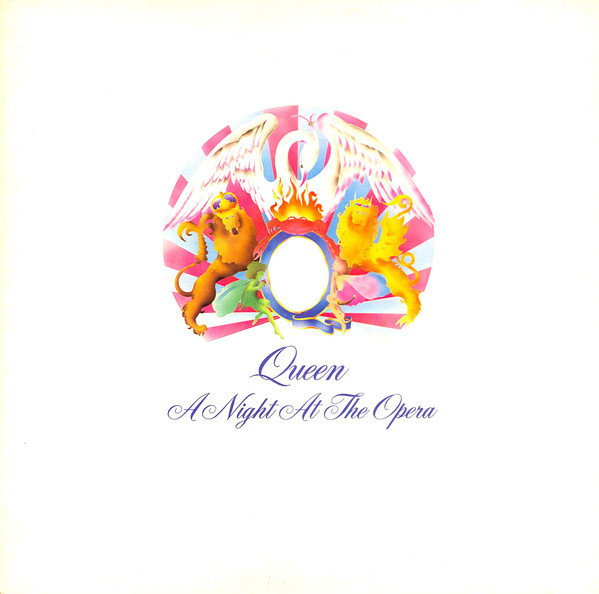 A Night at the Opera has some of Queen‘s best-known songs, including “Bohemian Rhapsody.” But what if I told you that “Bohemian Rhapsody” isn’t even the best song on A Night at the Opera, or at least not the most epic?
A Night at the Opera has some of Queen‘s best-known songs, including “Bohemian Rhapsody.” But what if I told you that “Bohemian Rhapsody” isn’t even the best song on A Night at the Opera, or at least not the most epic?
A Night at the Opera has Queen trying on a number of musical styles, sometimes several in the same song. The 1975 release has a proto-power ballad, ragtime, quasi-operatic epics, Dixieland, and (of course) straight-up rock ‘n roll.
It’s worth noting that everybody gets some time in the spotlight here, with songs by Freddie Mercury, Brian May, Roger Taylor, and John Deacon.
It’s not entirely clear what direction “Death on Two Legs (Dedicated To…)” is going to go in, at first, but it quickly comes into focus as one of Queen’s heavier numbers. May turns in some especially intricate fretwork on this one, and then it comes to a rather abrupt close.
[youtube https://youtu.be/c0DR9IJ9050]
The album pivots sharply to what sounds like something out of an old-timey radio show. Mercury’s vocals sound like they’re coming out of an old transistor radio, and he puts on an affectation of an older style. It’s right in and right back out again, with a run-time of just more than a minute, and then leads right into Taylor’s power ballad to his… car.
“I’m in Love with My Car” enjoyed, if not heavy rotation, at least regular play on Album Oriented Rock (AOR) when I was a kid. Not one of Queen’s biggest songs, but I knew it well before I ever picked up Opera. It pairs well with Deacon’s “You’re My Best Friend,” which is a little sappy but also almost impossible not to sing along with. From any other band it might sound a bit schmaltzy, but with Mercury on vocals it sounds entirely sincere. And, of course, it’s hard to ignore May’s solos.
Queen goes Sci-Fi
How many classic rock albums have wistful songs about the effects of time dilation? Damned few, I’d expect. Beautiful 12-string guitar on this, and Deacon on double bass.
[youtube https://youtu.be/WR7efZyHOLY]
After “39,” we need a little pick-up, and we get that (and then some) with “Sweet Lady.” This is a great romp, just pure fun. By this point in A Night at the Opera, you know to be prepared for anything – even a little ragtime-ish ditty like “Seaside Rendezvous” with a kazoo-chorus. Yes, you read that right.
Better than “Bohemian Rhapsody”
The first track on side two, for those who listened to the album first in a format that required “sides,” is more than eight minutes of bliss. “The Prophet’s Song,” for my money, is the most impressive track on the album. Like “Bohemian Rhapsody,” it incorporates Mercury doing rounds with himself thanks to the wonders of multi-track tape. It begins, and ends, with a lovely acoustic piece. It soon blossoms into an epic rock number, and then progresses into the aforementioned rounds.
All on its own it’s quite the musical journey.
“Love of My Life,” and “Good Company” are perfectly lovely. “Good Company,” again, expands Queen’s musical styles by dipping into a jazzy and unusual style. Lyrically it explores a similar theme to “Cat’s in the Cradle.” The song’s protagonist dives into his work to the point that he’s neglected friends, family, and finally is left by his wife. “All through the years in the end it appears, here was never really anyone but me.”
Now, what are the odds that anyone who’s read this far hasn’t heard “Bohemian Rhapsody”? It does not, frankly, seem very likely. Although these days I slightly prefer “Prophet’s Song” to “Rhapsody,” by no means does that imply I don’t love the song enormously. It’s an amazing piece of work, almost mind-blowing.
What can follow that? Very little, but you can’t close the album on that note! So Queen instead leave the album with an instrumental version of “God Save the Queen.”
I know that tastes vary when it comes to music. So it may be possible that a human could listen to A Night at the Opera and not love it. But you can’t listen to this one and not appreciate the genius at work and the sheer brilliance of the performances. It is one of the best albums produced in rock in the 70s, if not of all time.
